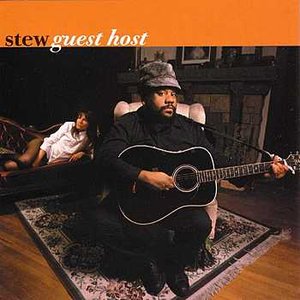Published on Jan 16, 2001
One of the most interesting singer/songwriters to come out of
the music scene these days is Mark Stewart (known by his stage
name, Stew). What makes him interesting is his combination of
satirical, off-center lyrics, with ’60s-inspired,
stick-in-your-head melodies. Stew is the leader of the Los
Angeles-based pop band The Negro Problem (an African-American
calling his band the Negro Problem gives you a clue to his weird
sense of humor). For 2000, he recorded his first solo CD,
Guest Host, and it’s his finest effort to date.
Like many solo efforts,
Guest Host is more introspective than his work with the
band. The Negro Problem’s sound defies description but I’ll take a
stab at it: just imagine, if you can, George Clinton collaborating
with Burt Bacharach. Really!
Guest Host emphasizes the quieter, ballad-oriented,
Bacharach side of Stew’s repetoire. Most of the songs have Stew
playing either acoustic guitar, piano, or organ, along with The
Negro Problem’s Heidi Rodewald on bass and backup vocals. Only the
two uptempo songs, “She’s Really A Daddy Feelgood” and the rousing
closer, “C’Mon Everybody” have a full band feel to them.
While
Guest Host may have its share of sweet, tender melodies, the
lyrics are often a different animal altogether. What has to be a
major highlight of this collection is “Rehab” (heck, I feel this is
one of the best songs of the year). This is a story about the
trials and tribulations of a recovering drug addict, done in a very
sing-song manner. I won’t reveal the gimmick behind this song, but
I’ll just say that the satire is as sharp as a Ginsu knife.
The other songs on this collection are no slouches either.
Stew’s gift for wordplay is in top form on songs like “Bijou”, a
mock French song about a wealthy French family. Here, he twist
words and gets unexpected rhymes that a rapper would probably kill
for. “Cavity” and “She’s Really A Daddy Feelgood” have their share
of strange and unexpected metaphors that at their best, convey
effectively what Stew is trying to say, but at other times are just
showcases for his verbal assaults.
While the arrangements are mostly straightforward, there is one
curiousity called “Man In A Dress”, which painstakingly sounds like
a 1920’s song, right down to its scratchy sound as if you are
playing an old 78rpm recording on a Victrola. However, this corny
sounding sendup of a more innocent time is combined with some very
contemporary lyrics, to the say the least.
Stew does show a serious side on
Guest Host. “The Stepford Lives” effectively describes a
failed marriage with sympathy and very little irony. There are
other straightforward songs as well. “Essence” is a good
old-fashioned midtempo love song, and on the slower, tender love
song, “Ordinary Love”, he conveys the same sympathy he displayed on
“The Stepford Lives”, but on a more personal level.
Guest Host is a consistently entertaining effort. The
melodies are strong, the arrangements are simple but not sparse,
making great use of Rodewald’s backup vocals, and although Stew’s
lyrics may be off-putting at first, let them sink in and their
charms may find their way to you. Overall, a great effort.
